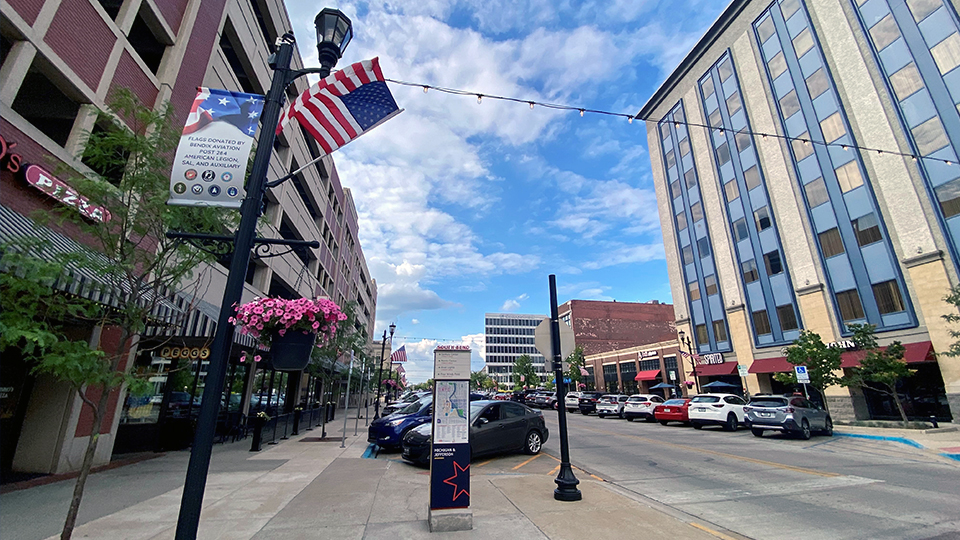South Bend votes to make liquor licenses more accessible to small business
Subscriber Benefit
As a subscriber you can listen to articles at work, in the car, or while you work out. Subscribe Now
South Bend is looking to make it easier for small businesses to earn and keep their liquor licenses.
The South Bend Common Council on Monday night approved an expansion of the city’s riverfront district, lowering the cost of three-way permits that allow for the sale of wine, beer and liquor.
Within the newly expanded district, approved businesses will pay only $2,000 for a license as compared to the approximately $60,000 local leaders say permits typical run in St. Joseph County.
The expanded district — which now encompasses existing and growing corridors like Mishawaka Avenue in the River Park neighborhood, parts of the Eddy Street development near Notre Dame and Portage Avenue and Lincoln Way West in the Near Northwest Neighborhood — is specifically designed to encourage the growth of small, local businesses that might otherwise struggle to field the cost of a $60,000 permit immediately upon opening.
It’s something the city has experienced success with within its longstanding riverfront district boundaries, which cover much of downtown South Bend and the growing East Bank area.
“DTSB is pleased to support the expansion,” said Willow Wetherall, executive director of the local nonprofit DTSB, which administers the program in partnership with the city. “We see it as highly beneficial for economic development in our corridors and we know that strong neighborhoods and strong downtowns go together.”

The riverfront district was first created in South Bend in June 2012 and was expanded once in 2013 and again in 2017.
The riverfront district runs nearly 10 miles along the St. Joseph River within the South Bend city limits. The district previously expanded to include businesses within 1,500 feet of the river on its east and west banks. Councilors voted Monday to double that buffer to 3,000 feet.
Under the riverfront district — a mechanism created by state law for local municipalities to adopt — South Bend businesses pay $1,000 to the state and $1,000 in administrative fees locally.
So far, as many as 32 businesses have taken advantage of the riverfront licensing within existing boundaries and Wetherall said as many as five more are ready to apply with the expansion.
Eamonn McParland, owner of the restaurant Roselily, is one of those owners. His restaurant in South Bend’s Renaissance District — an area just south of downtown encompassing a renovated Studebaker factory and planned redevelopment near Four Winds Field — falls within the expanded boundaries. He said the riverfront licenses newly available to his business can help Roselily expand into the upstairs of its building and introduce a new private dining room, cocktail bar and tasting room.
“By passing the liquor license expansion, you’re essentially expanding the limits of downtown and helping to lift up the forgotten neighborhoods,” McParland said. “We have guests that travel from Chicago, Michigan and Indy to dine with us. Not having a liquor license is holding us back and we’re not reaching our full potential.”
Roselily owner Eamonn McParland tells city councilors what an expanded riverfront district would mean for his restaurant.
Likewise, Francisco Macias, the owner of Franky’s Tacos, said his restaurant on Mishawaka Avenue already has a two-way liquor license, a cheaper permit allowing for the sale of wine and beer. But, as the restaurant plans an expansion, Macias says Franky’s Tacos will need to add to its menu what many of his larger competitors are already serving; mojitos and margaritas.
“We tried to make it with wine and it doesn’t taste good,” Macias said with a chuckle.
His restaurant is also expanding, investing $250,000 on a larger kitchen, patio and growth into the property next door.
“River Park’s coming back alive,” Macias said, “But, we need to be able to attract more people.”
Though the expansion received unanimous support from city councilors Monday night, South Bend Police Chief Scott Ruszkowski warned that some local businesses have not upheld local rules for permits.
DTSB’s Willow Wetherall speaks during public comment on her organization’s support of an expanded riverfront district.
Not everyone can apply for the riverfront licenses. City officials say the purpose of the district is to grant discounts to businesses that offer some form of dining or cultural experience. A DTSB committee reviews applications for renewals annually and with the passage of the expansion Monday, updated guidelines will go to the city’s redevelopment commission near the end of the month.
Though DTSB is an organization primarily focused on downtown, it makes sense and the nonprofit is willing, Wetherall said, to extend its administration to neighborhoods outside of the downtown area.
“We do have a system that works,” Wetherall said. “We’re ready to help support this.”
